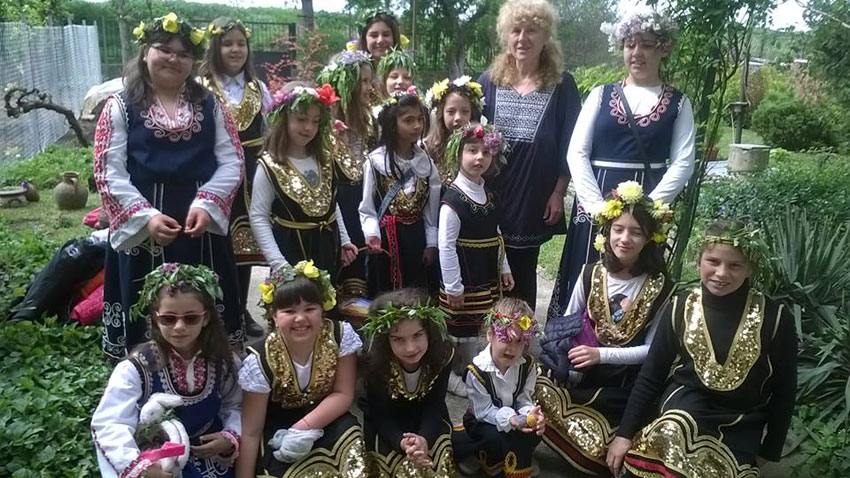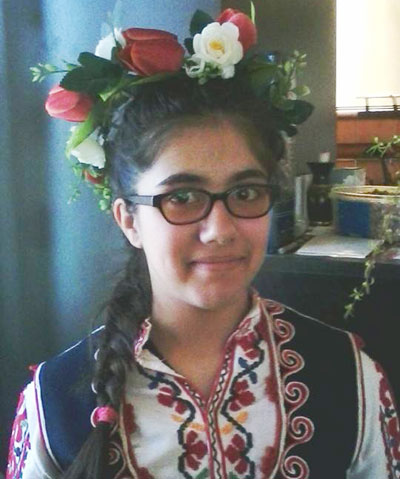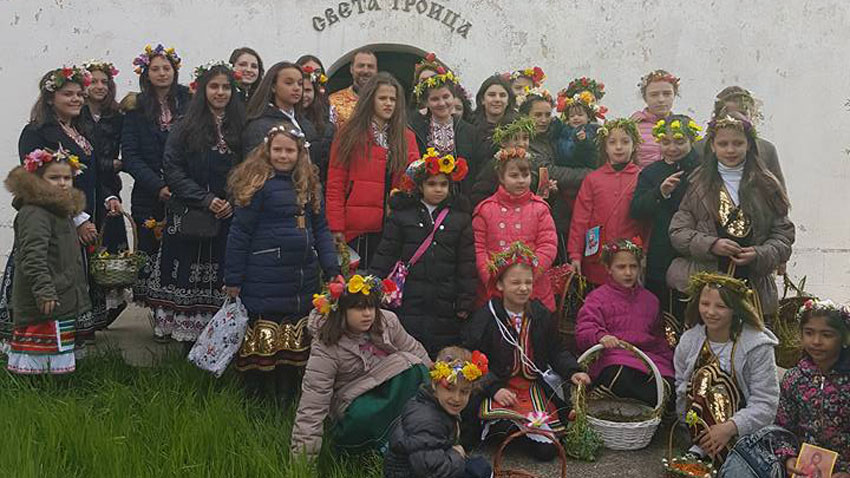Lazaritsa, Lazarovden, Lazarus’s Saturday are all names of the feast celebrated eight days ahead of Easter. The church marks the Resurrection of Lazarus and in the folklore calendar this time of the year is dedicated to the socialization of young girls. The custom is called Lazaruvane and is among the most vivid and vigorous traditions having survived for long centuries. In the past Lazarki girls would meet in the home of one of the women in the village – an experienced singer who knew ritual songs well enough. They would learn various melodies to sing during their tour of the community. The ritual is very much alive today though in a simplified version.
The girls willing to join Lazaruvane celebrations go to the community center of the village to receive folk costumes and song lyrics. Browsing in social networks one will come across announcements inviting girls to take part in traditional festivities. These are posted by community centers, leaders of amateur groups and teachers from various towns and villages who volunteer to keep Bulgarian folklore alive.

The ritual of Lazaruvane is a living tradition in the village of Mirovyane, today a suburb of the city of Sofia. The village emerged at the bottom of a lake in the ample Sofia field. Found ten kilometers away from the capital its population comes to about 1350. One of its youngest residents is 14-year-old Kristina Anastasova. She studies at the Ilia Petrov National School of Fine Art in Sofia. She tells us that she loves her native village dearly and that one of its most wonderful places in it is the community club – offering training in the arts and in folklore traditions. Thanks to the skills that she has learned there Kristina saw her first big dream come true – she was admitted to a leading high school that trains professional artists. This year the young artist is going to join Lazaruvane celebrations for a sixth year in a row.
 “I have been visiting the chitalishte (community club) since I was 10 years old. There we deal with interesting things - painting, singing, theater shows, meeting with our peers. I do not have singers in my family, but in connection with traditional holidays we revise all folk songs linked to them and this way we learn a lot. In my view, it is good to respect traditions. I like to make older people happy, reminding them of their time. We should keep connected and care for the past, not only for the future. When I take part in some of the ancient customs, I feel useful because I contribute to the traditions of the village. It is also a way for us, the young, to make clear we have not forgotten our roots. At the community club I have learned about many holidays - Christmas Eve and Christmas, Cheesefare Sunday, Baba Martha, St. George’s Feast. But my favorite holiday is Lazarovden. We gather together in the morning, dressed in folk costumes, wearing on our heads wreaths we made the previous day. First we go to the church where we read the story of Lazarus. Then we divide into two groups, walk around the houses and sing. People are very happy to see us and give us eggs, treats, sometimes money. We leave everything we have collected in one place and go to the river. There we remove the wreaths and throw them into the water. The girl whose wreath passes under the bridge first becomes a kumitsa (best girl) and has to invite everyone to her home. There we distribute the gifts, sing and have fun. I have always had great memories from Lazarovden: it is a a wonderful experience. We owe all this to Mrs. Ventsislava Poteva, the librarian of the community club. She organizes us and gives us the folk costumes. With her we revise the songs. There are verses and chants for every member of the family – for a little girl, a girl or a boy mature enough to get married etc. Incantations include wishes for health and prosperity. This is the meaning of celebrations – wishing all the best to the people.”
“I have been visiting the chitalishte (community club) since I was 10 years old. There we deal with interesting things - painting, singing, theater shows, meeting with our peers. I do not have singers in my family, but in connection with traditional holidays we revise all folk songs linked to them and this way we learn a lot. In my view, it is good to respect traditions. I like to make older people happy, reminding them of their time. We should keep connected and care for the past, not only for the future. When I take part in some of the ancient customs, I feel useful because I contribute to the traditions of the village. It is also a way for us, the young, to make clear we have not forgotten our roots. At the community club I have learned about many holidays - Christmas Eve and Christmas, Cheesefare Sunday, Baba Martha, St. George’s Feast. But my favorite holiday is Lazarovden. We gather together in the morning, dressed in folk costumes, wearing on our heads wreaths we made the previous day. First we go to the church where we read the story of Lazarus. Then we divide into two groups, walk around the houses and sing. People are very happy to see us and give us eggs, treats, sometimes money. We leave everything we have collected in one place and go to the river. There we remove the wreaths and throw them into the water. The girl whose wreath passes under the bridge first becomes a kumitsa (best girl) and has to invite everyone to her home. There we distribute the gifts, sing and have fun. I have always had great memories from Lazarovden: it is a a wonderful experience. We owe all this to Mrs. Ventsislava Poteva, the librarian of the community club. She organizes us and gives us the folk costumes. With her we revise the songs. There are verses and chants for every member of the family – for a little girl, a girl or a boy mature enough to get married etc. Incantations include wishes for health and prosperity. This is the meaning of celebrations – wishing all the best to the people.”
The folklore group has no recordings of its Lazarus songs yet but girls stick to melodies and lyrics typical of the Western Bulgarian Shoppe region.

When she joins Lazaruvane festivities Kristina and her fellow Lazarus girls put coats over the folk costumes – in case the weather is cold. Sometimes they wear sports shoes, again due to bad weather. On certain occasions they may wear artificial flowers on their heads. What matters though is that the essence of the ritual is preserved – youth and beauty has visited the community’s homes to bring best wishes for happiness and wellbeing.
English Daniela Konstantinova
Photos: private library
The historic town of Tryavna will celebrate St Lazarus' Day, traditionally held on the Saturday before Palm Sunday. The Bulgarian custom, known as lazaruvane , is closely linked to the themes of love and marriage and will be re-enacted this..
The feast of the Annunciation (Blagoveshtenie in Bulgaria) is a holy day , a symbol of God’s infinite mercy to people and especially to women, blessed to bear new life, but also an embodiment of the eternal human longing for something better in the..
Clocks and bells will ring out in the center of Stara Zagora on Saturday, when the city will host the XXIV Masquerade Games Festival . The event will start with a traditional parade of participants. Attractive babugers, araps, old men and other..

+359 2 9336 661
